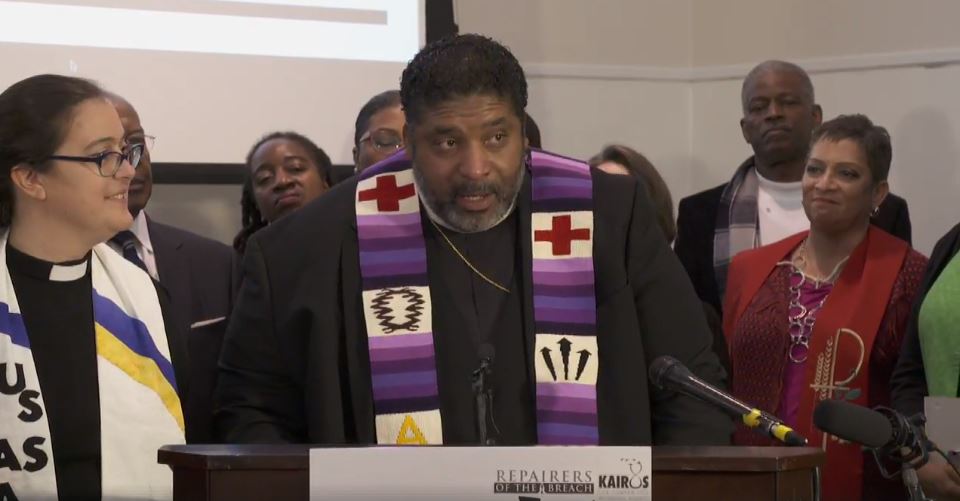Activists on the Religious Left have launched a reincarnation of the “Poor People’s Campaign”. Originally led by Martin Luther King Jr. fifty years ago, the campaign initially sought a “middle ground between riots on the one hand and timid supplications for justice on the other” in 1967-1968. Today the campaign has morphed into a more divisive movement.
The Poor People’s Campaign claims to be non-partisan in its fundamental principles: “This is not about left and right, Democrat or Republican but about right and wrong.” However, in the same document, the campaign simultaneously denounces “religious extremists” for supporting conservative social positions which they label as a “distorted moral narrative.” They explicitly call to change the conversation to progressive talking points:
We aim to shift the distorted moral narrative often promoted by religious extremists in the nation from personal issues like prayer in school, abortion, sexuality, gun rights, property rights to systemic injustices like how our society treats the poor, those on the margins, the least of these, women, children, workers, immigrants and the sick; equality and representation under the law; and the desire for peace, love and harmony within and among nations.
The Rev. Dr. Liz Theoharis, Co-Director of the Kairos Center and Co-Chair of the Poor People’s Campaign, repeated this and other points from the fundamental principles almost verbatim at the press conference launching the campaign on December 4. The press conference was hosted at the United Methodist Building on Capitol Hill in Washington, D.C., home of the highly progressive General Board of Church and Society (GBCS) of the United Methodist Church (UMC).
The Rev. Dr. William J. Barber II, President of Repairers of the Breach, also spoke at the press conference. Larry Cox, Executive Director of the Poor People’s Project, introduced Barber and Theoharis as “two of the most prophetic and powerful voices of our time.”
Barber resigned as North Carolina NAACP President in May in order to co-chair the Poor People’s Campaign. At the time, the liberal activist made a strange denunciation of conservatives for not enacting his progressive welfare and civil rights agenda. Yet he also identified the campaign as non-partisan and “not about left versus right.”
“Extremism is at work in other states and has gained power in all three branches of our federal government, much as it did here four years ago,” Barber said on May 15 in North Carolina, as quoted by The Nation. He added: “There are certain things that are not left, right, but they are the center of authentic moral values—like love, like justice, like mercy, like caring for the least of these.”
At the press conference at the United Methodist Building, Theoharis delved into specific policies. This included criticizing the GOP tax plan. She denounced tax cuts for the wealthy while calling for greater spending on healthcare, government services, and welfare.
Theoharis also attempted to pass off several dubious statements as “facts.” She questioned why the federal government spent vastly more on the military ($630 billion) than on education, healthcare, housing, job training, and “other basic human needs” ($183 billion). Yet she conveniently ignored that states and local governments, along with private funding, finance the vast majority of education in the United States. This total is nearly double military spending, according to the Department of Education:
Of an estimated $1.15 trillion being spent nationwide on education at all levels for school year 2012-2013, a substantial majority will come from State, local, and private sources. This is especially true at the elementary and secondary level, where about 92 percent of the funds will come from non-Federal sources.
Immediately after this, Theoharis also said 9 million people die per year from pollution, allegedly “more than any other source of death,” before proceeding to cite statistics about contaminated drinking water in the United States. But Theoharis skipped some key details.
She failed to mention these 9 million deaths from pollution included the total number from all countries worldwide, not just the United States. Most of these deaths occurred in developing countries and the third world. Only an estimated 155,155 pollution-related deaths occurred in the United States.
Perhaps the most egregious fact Theohari ignores is that 55.7 million abortions occur around the world every year, dwarfing the deaths caused by pollution. Moreover, a study released in October found that almost half of these abortions “were performed in an unsafe manner, putting women at risk for serious complications,” as reported by CNN. In the U.S., an estimated 926,200 abortions occurred in 2014, the most recent year of available data. Abortions hence far exceed any other cause of death in the country (with heart disease, the next highest cause of death, claiming 614,348 victims).
Of course, Theohari had denounced pro-life advocates as “extremists” moments earlier. Barber engaged in some similar name-calling against conservatives over the summer. He branded the Religious Right as “heretics” for allegedly opposing abortion and other progressive policies, while allegedly supporting a platform that “abort individuals’ hopes and dreams.” But it hardly seems like a “complete life ethic” to characterize opponents of the largest form of global and national death in this way.
Following the press conference, clergy conducted an act of civil disobedience by entering the Capitol Building uninvited to pray in a kind of demonstration. They also attempted to deliver a letter to Senate Majority Leader Mitch McConnell protesting the GOP-sponsored tax bill. The Poor People’s Campaign plans to coordinate similar acts of civil disobedience in state capitals across the country.
In this case, Capitol Police ordered them to leave. Union Theological Seminary (UTS), which sponsors the Kairos Center, expressed moral outrage at the “ultimatum” from police to “leave the Capitol or be arrested.” Benjamin Perry, Assistant Director of Communications and Marketing at UTS, wrote:
Powerful forces do not want to confront these issues. Despite this framing, however, it’s still surreal to witness clergy expelled from the seat of our democracy for praying we might address rampant poverty, while leaders inside plan the single largest upward redistribution of wealth in our nation’s history.
Institute on Religion and Democracy (IRD) President Mark Tooley responded in a tweet: “These ‘prayers’ were planned acts of civil disobedience intended to provoke arrest as photo op for political advocacy. Are such ‘prayers’ really prayer? Or posturing?”
These “prayers” were planned acts of civil disobedience intended to provoke arrest as photo op for political advocacy. Are such “prayers” really prayer? Or posturing? https://t.co/5ZvqpJWS2F
— @markdtooley (@markdtooley) December 11, 2017
Sadly, this type of rhetoric surrounding the Poor People’s Campaign undermines their message. Their use of political posturing, selective use of data, and divisive rhetoric to rally their progressive base leaves little room for unifying with religious conservatives to combat poverty in the U.S.
Many religious conservatives care about poverty. Religious conservatives rank among the most privately generous individuals in the country. New York Times columnist Nicholas Kristof once observed:
Liberals show tremendous compassion in pushing for generous government spending to help the neediest people at home and abroad. Yet when it comes to individual contributions to charitable causes, liberals are cheapskates.
So progressives, like those leading the Poor People’s Campaign, should be careful of imputing nefarious motives to their opponents. Just because conservatives tend to favor personal charity along with programs coordinated at the state and local level rather than the federal government fails to prove they lack compassion.
Often, conservatives support a relatively small federal government focused on providing unique services like providing for the common defense that private citizens, churches, charities and charities simply cannot. They tend to view welfare and charity as the realm of more localized governments, private organizations, and individuals.
Although progressives may disagree with this philosophy, this vision for government (generally associated with the Religious Right) is indeed a coherent one. In contrast, when the Poor People’s Campaign seemingly dismisses fundamental government functions like protecting property rights and regulating abortion as extremism, this belies liberals’ criticism of conservatives as failing to support a “consistent life ethic.” Indeed, these types of fundamental tasks remain essential for the government’s core duty to protect the life and liberty of its citizens.
The Poor People’s Campaign will likely continue employing divisive language in the coming months. But sooner or later its organizers and supporters should pause to reflect whether they really support a consistent life ethic and whether their opponents are really the extreme ones.





Comment by Eternity Matters on December 15, 2017 at 7:09 pm
“There are certain things that are not left, right, but they are the center of authentic moral values—like love, like justice, like mercy, like caring for the least of these.”
What a fraud! He is a typical pro-abortion “Christian” Leftist, supporting abortion to the child’s 1st breath. And ironically, abortions kill blacks at a rate 3 times that of whites. Seems kinda racist.
Comment by Donald on December 16, 2017 at 6:06 am
Same list of Progressive causes and talking points that have reduced membership in the former “Mainline Protestant denominations. This is another signal of the desperation of these frauds who still inhabit the halls of power in these Legacy denominations. The American people realize these frauds for who they are and will continue to reject this latest project.
Comment by William on December 16, 2017 at 9:30 am
It is always so, so revealing — these progressives are in lock step by IGNORING sexual immorality, in fact celebrating it in certain quarters, while at the same time aggressively pushing the abortion agenda across the board. Their redistribution of wealth agenda, communism, has already gone up in smoke — perhaps they missed that history lesson. Instead of another expensive movement (who is paying for their gatherings, organization?), put their money where there mouths are — giving said money directly to the poor or Christian organizations that actually help the poor. Take a look at The Salvation Army, for example, for some guidance, direction, organizational ideas, and service to the needy instead of becoming just another sounding gong, left wing activist group.
Comment by CB on September 18, 2018 at 4:45 pm
Your title says the “religious left”, however you show a picture of Rev. Dr. Barber who is a centrist.
Comment by Jeffrey Walton on September 19, 2018 at 4:50 pm
I suppose that is a matter of perspective. It’s fair to say that most readers on this site would identify Barber on the Religious Left, as he is both an ordained clergyman in a Mainline Protestant denomination (the Christian Church, Disciples of Christ) and his political advocacy and associations are all in favor of an expansive welfare state, increased government regulation, and military disarmament. In the U.S. political context, these positions are typically associated with the political left.
Comment by Brian Morris on May 26, 2020 at 6:40 pm
Rather than trying to identify someone or something as “left” or “right”, is it possible to agree that something is wrong in this society that needs repair? The statement above that the abortion rate for blacks is 3x that of whites to me (assuming it’s true) indicates that there’s a problem that needs solving, doesn’t it? The fact that covid kills so many more blacks than whites is also an indication of a problem, it seems to me. Does it make sense for people of faith and good will to concede that something needs to be done, and then work toward the discovery and implementation of a solution? If not, why not? If you meet somebody and you work hard enough, chances are you’ll find something really meaty to disagree on. On the other hand, if you decide on a common purpose to solve a problem, maybe you’ll get something done!